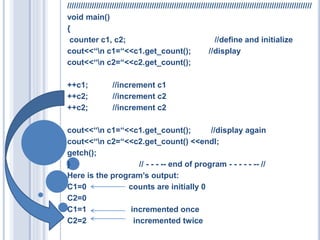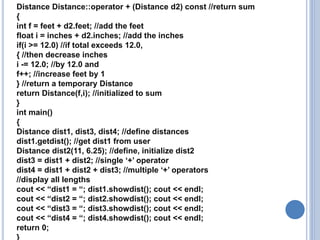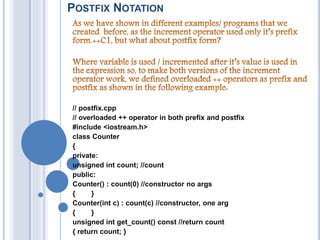operator overloading
- 1. + - * / % & ! = ^ < > << >> ? | += -= *= /= %= != &= >= <= && || ++ - -
- 2. . i.e. to overload an operator is to provide it a new meaning for user defined data types. In simple words we can say that by using Operator Overloading we can perform basic operations like (Addition, Subtraction, multiplication, Division and so on………..) on our own defined objects of the class By Overloading the appropriate Operators, you can use Objects in expressions in just the same way that you use built in data types in C++ Operator overloading allows full integration of new data types into the programming environment because operators can be extended to work not just with built-in data types but also with classes. Operator Overloading is One of the most exciting feature of Object oriented programming. In C++ the Overloading principle applies not only to function but to operators as well.
- 3. O P E R A T O R O V E R L O A D I N G Explanation Normally a=b+c ; works only with basic data types such as int and float, and attempting to apply it when a b and c are objects of primitive data types. However we can make this statement legal even when a b and c are user defined data_types. And actually oprator_overloading is the only feature that gives you opportunity to redefine the C++ Language.
- 5. An Example that will illustrate how to overload unary operators: //Increment counter variable with ++ Operator ////////////////////////////////////////////////////////////////////////////////////// #include<iostream.h> #include<conio.h> Class counter { private: int count; //count public: counter() : count(0) //constructor { } int get_count() //return count Void operator ++() //increment (prefix) { ++count; } };
- 6. ////////////////////////////////////////////////////////////////////////////////////////////////////////////// void main() { counter c1, c2; //define and initialize cout<<“n c1=“<<c1.get_count(); //display cout<<“n c2=“<<c2.get_count(); ++c1; //increment c1 ++c2; //increment c2 ++c2; //increment c2 cout<<“n c1=“<<c1.get_count(); //display again cout<<“n c2=“<<c2.get_count() <<endl; getch(); } // - - - -- end of program - - - - - -- // Here is the program’s output: C1=0 counts are initially 0 C2=0 C1=1 incremented once C2=2 incremented twice
- 7. OPERATOR ARGUMENTS In main () the ++ operator is applied to a specific object, as in the expression ++c1. Yet operator++() takes no arguments. What does this operator increment? It increments the Count data in the object of which it is a member. Since member functions can always access the particular object for which they’ve been invoked, this operator requires no arguments.
- 9. Binary Operators can be overloaded just as easily as Unary operators, we frequently use binary operators to perform various arithmetic operations, but by overloading binary operators we are able to perform various arithmetic operations on our own user-defined data types. Binary Arithmetic Operators Relational Operators Logical Operators
- 10. OVERLOADING ARITHMETIC OPERATOR Some of the most commonly used operators in C++ are the arithmetic operators i.e. addition operator (+), subtraction operator (-), multiplication operator (*) and division operator(/). All the Arithmetic operators are Binary operators and binary operators and binary operators are overloaded in exactly the same way as the unary operators. Binary operators operate on two operands. i.e. One from each side of the operator. For example: a + b, a – b, a * b, a / b.
- 11. Here is a program that will show you how to overload arithmetic operator. // overloaded ‘+’ operator adds two Distances #include <iostream.h> class Distance //English Distance class { private: int feet; float inches; public: //constructor (no args) Distance() : feet(0), inches(0.0) { } //constructor (two args) Distance(int ft, float in) : feet(ft), inches(in) { } void getdist() //get length from user { cout << “nEnter feet: “; cin >> feet; cout << “Enter inches: “; cin >> inches; } void showdist() const //display distance { cout << feet << “’-” << inches << ‘”’; } Distance operator + ( Distance ) const; //add 2 distances };
- 12. Distance Distance::operator + (Distance d2) const //return sum { int f = feet + d2.feet; //add the feet float i = inches + d2.inches; //add the inches if(i >= 12.0) //if total exceeds 12.0, { //then decrease inches i -= 12.0; //by 12.0 and f++; //increase feet by 1 } //return a temporary Distance return Distance(f,i); //initialized to sum } int main() { Distance dist1, dist3, dist4; //define distances dist1.getdist(); //get dist1 from user Distance dist2(11, 6.25); //define, initialize dist2 dist3 = dist1 + dist2; //single ‘+’ operator dist4 = dist1 + dist2 + dist3; //multiple ‘+’ operators //display all lengths cout << “dist1 = “; dist1.showdist(); cout << endl; cout << “dist2 = “; dist2.showdist(); cout << endl; cout << “dist3 = “; dist3.showdist(); cout << endl; cout << “dist4 = “; dist4.showdist(); cout << endl; return 0; }
- 13. Explanation To show that the result of an addition can be used in another addition as well as in an assignment, another addition is performed in main(). We add dist1, dist2, and dist3 to obtain dist4 (which should be double the value of dist3), in the statement dist4 = dist1 + dist2 + dist3; Here’s the output from the program: Enter feet: 10 Enter inches: 6.5 dist1 = 10’-6.5” ← from user dist2 = 11’-6.25” ← initialized in program dist3 = 22’-0.75” ← dist1+dist2 dist4 = 44’-1.5” ← dist1+dist2+dist3
- 14. OVERLOADING RELATIONAL OPERATORS There are various relational operators in C++ like (< ,>, <=, >=, == , etc.) these operators can be used to compare C++ built-in data types. Any of these operators can be overloaded, which can be used to compare the objects of a class. Following EXAMPLE explains how a < operator can be overloaded, and in the same way we are able to overload the other relational operators. All relational operators are binary, and should return either true or false. Generally, all six operators can be based off a comparison function, or each other, although this is never done automatically (e.g. overloading > will not automatically overload < to give the opposite).
- 15. #include<iostream.h> Class Distance { private: int feet; int inches; public: Distance() { feet=0; inches=0;} Distance(int f, int i) { feet = f; inches=i; } Void displayDistance () { cout<<“F: “<<feet<<“I:”<<inches<<endl; } Distance operator - () { feet=-feet; inches=-inches; return Distance(feet, inches); }
- 16. bool operator < (const Distance & d) { if(feet<d.feet) {return true; } if(feet==d.feet && inches < d.inches) {return true;} Return false; } }; ////////////////////////////////////////////////////////////////////////////////////////////////////
- 18. ARITHMETIC ASSIGNMENT OPERATORS Arithmetic Assignment operators are overloaded in exactly the same way as we have overloaded all other arithmetic operators and these operators can be used to create an object just like copy constructors. The following example explains how to overload an arithmetic operator. `````````````````````````````````````````````````````````````````````````````````` // overload ‘+=‘ assignment operator #include<iostream.h> class Distance //English Distance class { private: int feet; float inches; public: //constructor (no args) Distance() : feet(0), inches(0.0) { } //constructor (two args) Distance(int ft, float in) : feet(ft), inches(in) { }
- 19. //-------------------------------------------------------------- //add distance to this one void Distance::operator += (Distance d2) { feet += d2.feet; //add the feet inches += d2.inches; //add the inches if(inches >= 12.0) //if total exceeds 12.0, { //then decrease inches inches -= 12.0; //by 12.0 and feet++; //increase feet } //by 1 } //////////////////////////////////////////////////////////////// void getdist( ) //get length from user { cout << “nEnter feet: “; cin >> feet; cout << “Enter inches: “; cin >> inches; } void showdist() const //display distance { cout << feet << “’-” << inches << ‘”’; } void operator += ( Distance ); };
- 20. int main() { Distance dist1; //define dist1 dist1.getdist(); //get dist1 from user cout << “ndist1 = “; dist1.showdist(); Distance dist2(11, 6.25); //define, initialize dist2 cout << “ndist2 = “; dist2.showdist(); dist1 += dist2; //dist1 = dist1 + dist2 cout << “n After addition,”; cout << “ndist1 = “; dist1.showdist(); cout << endl; return 0; } ////////////////////////////////////////////////////////////////////////////////////////////////////////////////////////////
- 21. The Operator Keyword Sometimes question arises, How a normal C++ operator act on a user-defined operand? The Operator keyword is used to overload the ++ operator in this declarator. e.g. void operator ++(). Where void is the return type, the operator keyword is the name of a function and the operator ++(). This declarator syntax tells the compiler to call this member function, whenever the ++ operator is encountered. If the operand is a basic type such as int as in ++ intvar, then compiler use it’s built in routine to increment as int. The compiler will know to use user-written operator ++() instead.
- 23. Here’s the example: #include <iostream> using namespace std; //////////////////////////////////////////////////////////////// class Counter { private: unsigned int count; //count public: Counter() : count(0) //constructor no args { } Counter(int c) : count(c) //constructor, one arg { } unsigned int get_count() //return count { return count; } Counter operator ++ () //increment count { ++count; // increment count, then return return Counter(count); // an unnamed temporary object } // initialized to this count }; ////////////////////////////////////////////////////////////////
- 24. int main() { Counter c1, c2; //c1=0, c2=0 cout << “nc1=” << c1.get_count(); //display cout << “nc2=” << c2.get_count(); ++c1; //c1=1 c2 = ++c1; //c1=2, c2=2 cout << “nc1=” << c1.get_count(); //display again cout << “nc2=” << c2.get_count() << endl; return 0; }
- 25. POSTFIX NOTATION // postfix.cpp // overloaded ++ operator in both prefix and postfix #include <iostream.h> class Counter { private: unsigned int count; //count public: Counter() : count(0) //constructor no args { } Counter(int c) : count(c) //constructor, one arg { } unsigned int get_count() const //return count { return count; }
- 26. { //increment count, then return return Counter(++count); //an unnamed temporary object } //initialized to this count Counter operator ++ (int) //increment count (postfix) { //return an unnamed temporary return Counter(count++); //object initialized to this } //count, then increment count }; //////////////////////////////////////////////////////////////// int main() { Counter c1, c2; //c1=0, c2=0 cout << “nc1=” << c1.get_count(); //display cout << “nc2=” << c2.get_count(); ++c1; //c1=1 c2 = ++c1; //c1=2, c2=2 (prefix) cout << “nc1=” << c1.get_count(); //display cout << “nc2=” << c2.get_count(); c2 = c1++; //c1=3, c2=2 (postfix) cout << “nc1=” << c1.get_count(); //display again cout << “nc2=” << c2.get_count() << endl; return 0; } Counter operator ++ () //increment count (prefix)
- 27. Restrictions On Operator Overloading There are Some Restrictions that apply to operator overloading, for example we can not alter the precedence of an operator. We cannot change the number of operands, that an operator takes. Operator function can not have default arguments. No new operators can be created. Finally the following operators ca not be overloaded: . :: .* ?




























